What I Learned Building – And Losing – A Million Dollar Company: How Failure Set Me Free
They always say the first million is the hardest. And you know what? They’re right. I learned a lot making the first million. But I learned even more losing it. In this post, I’m going to tell you why.
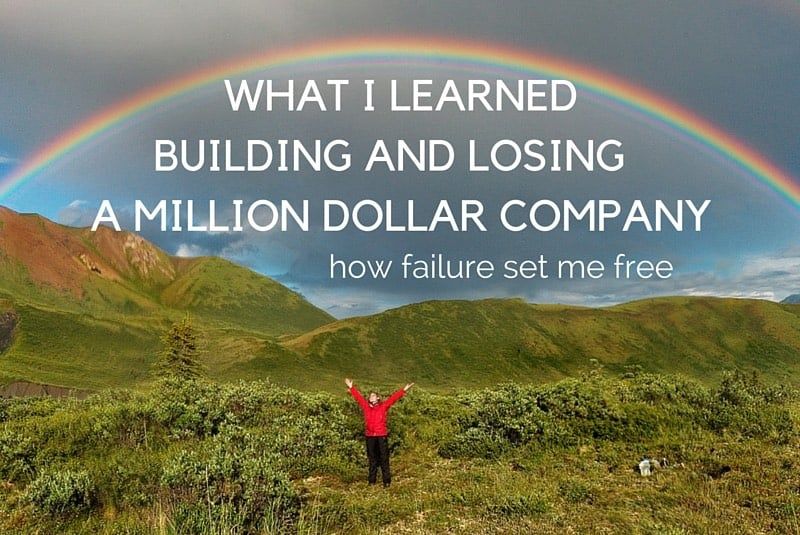
They always say the first million is the hardest. And you know what? They’re right. I learned a lot making the first million. But I learned even more losing it. In this post, I’m going to tell you why.
Now, I know, this is a real food/mommy blog. Not a business blog. I promise, we’re gonna get back to pressure cooker carnitas recipes and posts about how I lost 30 pounds in the past 4 months baby-wearing and breastfeeding.
But I gotta get this off my chest first. This is a long post, and trust me, I will not be offended if you don’t read it. Most of my posts I write for my readers. This one I have to write for me. Honestly, I feel ashamed that this is so long. Because I think, who will want to read this? But again, it’s what I need to do to heal.
A year and a half ago, my life was ripped apart at the seams. The business we spent almost a decade growing imploded overnight and shattered into smithereens. We lost what seemed like everything (at the time). All our money. All my friends. Or at least, people I thought were my friends. The reputation and relationships I worked so hard to nurture and build over the years — all gone.
Our family became so buried in debt, I could not even afford the hosting for this blog — which is why I shut it down last May. Every single credit card has been maxed out and it’s been a struggle each month to pay the mortgage.
Even worse, people were saying nasty things about me online. None of what these people said was true. But it didn’t make it hurt any less. As terrible as the financial stress was, the rumors and lies people were spreading about me were much more painful.
I need to write this post in order to tell my truth. After two years of unmitigated hell, I want to close this chapter of my life and move on to the next. In the words of one of my heroes, Brené Brown, I need to show up and “own my story”.
“When we deny our stories, they define us.
When we run from struggle, we are never free.
So we turn toward truth and look it in the eye.
We will not be characters in our stories.
Not villains, not victims, not even heroes.
We are the authors of our lives.
We write our own daring endings.
We craft love from heartbreak.
Compassion from shame.
Grace from disappointment.
Courage from failure.
Showing up is our power.
Story is our way home. Truth is our song.
We are the brave and brokenhearted.
We are rising strong.”
— Brené Brown
I have no regrets. And I don’t blame anyone for anything. Because I think everything played out exactly the way it was supposed to.
I am grateful for everyone who was involved and I forgive any of the mistakes any of us made, including the mistakes I made. And I made many. We are all human and we are fallible. And instead of labeling things as “mistakes” and “failure” — maybe we should just call them steps along the path to success.
I am extremely thankful for the crash of the business. It turned out to be the best thing that has ever happened to me.
I’ll explain why. But first I need to tell the story of how it played out.
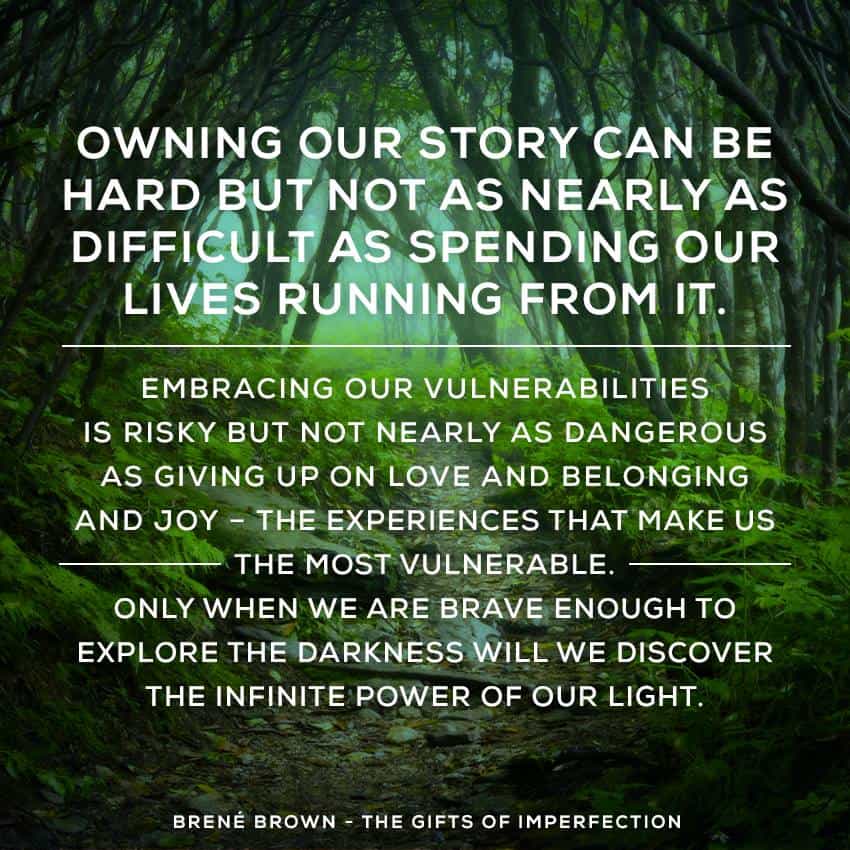
Starting the Cheeseslave Blog
I started writing the Cheeseslave blog eight years ago when my daughter Kate was a baby. I didn’t start the blog because I wanted to write a blog. I did it because I wanted a community of like-minded people who could support each other in common goals of feeding our kids real food, supporting small farms, and other crunchy mom stuff like cloth diapers, homeschooling, and breast-feeding.
Because I didn’t have a lot of support when it came to crunchy mom stuff. This isn’t Portland. It’s L.A. — Botox capital of the world, right? One time, when Kate was a baby I was feeding her raw milk and liver at my mom’s group. I remember the evil eye I got from another mom feeding her baby Cheerios and soy milk formula. And there was the time I told my pediatrician that I wanted to delay vaccines while I did more research. He told me that if Kate died of whooping cough it would be my fault. (Who says that!?)
Raw milk and liver and anti-vaccine? Not exactly the way to win friends and influence people. I was a Star-Belly Sneetch in a world of Plain-Belly Sneetches. I dreamed of a network of supportive friends who thought the same way I did. So I figured I’d start a blog, and express my thoughts and feelings. And I thought maybe people who are into kind of stuff this will read it one day.
It took a while but eventually the Cheeseslave community of readers rose up around this blog. In time, I had the community of awesome crunchy moms and friends that I was dreaming of. It actually became much bigger than I ever hoped for.
And then one day I realized my blog was helping other people much more than it was helping me. After I had been writing the blog for a year or two, I got a comment from a reader.
She said (paraphrase), “Thank you for your blog. My son stopped babbling and lost all language at 18 months after he had the MMR vaccine. He is 3 now and I started him on the GAPS diet a week ago. He just spoke his first words in a year and a half. He said, ‘I love you, Mom.'”
I cried when I read that comment. And I made a vow to never stop blogging. Because you never know whose life you will impact. And getting your son back — that’s a miracle.
If I can somehow contribute to miracles like that, even occasionally, I’m in. I’m all in.
Making a Million Dollars with Village Green Network
In November of 2008, one year after I started Cheeseslave, I founded a blog network, Real Food Media, which later became Village Green Network. (Thanks to my friend Jonathan Drake who originally gave me the idea, not to mention the domain name.) I had two goals for the company: (1) To help real food and healthy living bloggers grow their traffic and influence and (2) To help sponsors we believed in sell more products and services to their customers.
I started the business with a laptop on our coffee table. Within five years, it grew to over $1 million in annual revenue.
Looking back, I’m proud of that. I’m proud also that the network helped so many people. Working together, we all learned a lot from each other. And the network helped a number of our bloggers create six-figure incomes.
I also believe our network played a huge role in swaying public opinion of real food — from coconut oil and other saturated fats to grass-fed meat and dairy to kombucha and other fermented foods. I remember when I started blogging back in 2007, nobody was talking about coconut oil or raw milk or kombucha. Thanks to the influence of blogging and social media, we were able to help get the message out about these healthy, nutrient-dense foods.
And as a result, many of these foods have now gone mainstream. You can buy coconut oil at Costco! My daughter and I were watching “Jessie” on the Disney channel the other night and there was a whole episode about a kombucha SCOBY. And “grass-fed” is a term I now commonly hear at the farmer’s market and Whole Foods.
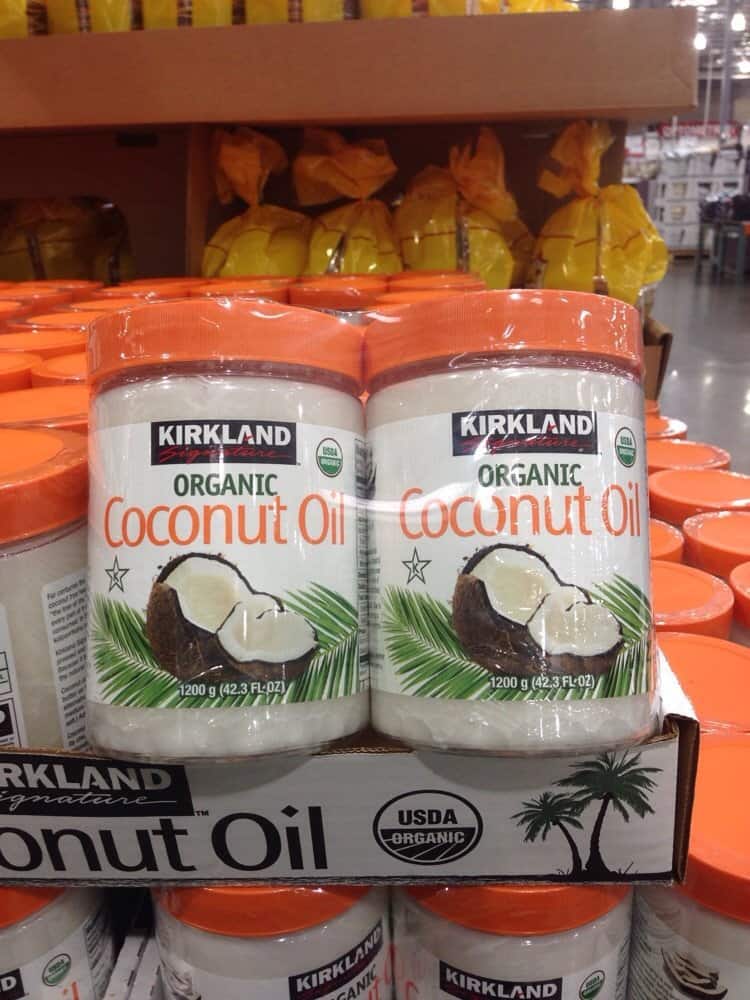
Just Because You Make a Million Dollars Doesn’t Mean You Get to Keep It
The first couple years I made almost no money with the business. I got up every morning at 3 or 4 in the morning to squeeze in a few coffee-fueled hours of work before my daughter woke up. And I spent the next five years working 60 to 80 hours per week. I sacrificed a hell of a lot to build the business including time with my daughter which I will never get back. I did it because I really believed in what we were doing.
I also wanted to be able to provide for my family. I had finally paid off my credit card debt before starting the business which was a great feeling. The last thing I wanted to do was go back to my corporate advertising job. I was never the corporate kind of person. I always wanted to be an entrepreneur, and build a business. I also wanted to start saving for retirement and my daughter’s college fund. I went through a divorce and the dot com crash the decade before and I had no money in retirement. I had nothing to my name but a car that was paid off and a lot of student loan debt.
So in 2013, the company generated over $1 million in revenue. Almost all of that went right back out. We paid out nearly $850,000 that year just paying people. The vast majority went to bloggers in our network. The rest went to lawyers, accountants, virtual assistants and other contractors. After our expenses, we kept only 11%, which was $126,000.
My husband and I were both working in the business 60-80 hours per week (he joined the company to help me scale it in 2012). This was after years of me paying myself the bare minimum. I always put the money right back into the business. $126,000 divided by two people is not a lot of money — $63,000 each. 60 hours per week times 50 weeks = 3000 hours per year. So that means my husband and I made around $21 per hour in 2013.
But it’s worse than that because we stopped paying ourselves in January of 2014 when the bloggers quit. So my husband and I didn’t make a dime from VGN in 2014. And we had to continue paying all the business expenses, which we put on our credit cards.
The business lost over $100,000 in 2014. So we made less than $26,000 total between 2013-2014. That’s $13,000 per year. $6,500 per year per person. Which amounts to a salary of just over $2 per hour. It occurs to me now that we would have made more money as migrant farm workers.
I’m not telling you this to make you feel sorry for us. I’m telling you this because people have been posting online that we did not pay people because we spent all the money on ourselves. Which is a lie.
The truth is we made less than the poverty level over the past two years, and we are still very, very deep in debt. It’s going to take years for our family to rebuild our finances.
But we will rebuild because you know what? And this is the best part. Once you’ve done something you didn’t know you could do, you can always do it again.
It’s the first time you do something that’s hard. Yeah, it sucks to have to start over from scratch and do it all over again. But if you’ve done it once, you know you can do it again.
Scaling Up
So how the heck did all of this happen?
Things were fine for the first 4 years, until I made the decision in 2012 to scale the business up to a multimillion dollar organization. Prior to that it was just a little one-person operation I ran out of my home. And I was making decent money — I had replaced my corporate advertising salary.
But I wanted to create something that I could hand off to a team and actually have a life instead of working 60 hours a week for the next few decades. That way, if I chose to, I could also sell the company. You get to a point in business where you’re working all the time and the business owns you. And suddenly you don’t have your own business anymore — you have a job. That is where I was at in 2012.
My husband Seth joined me in the company in 2012 to help me scale the business up. I had been holding it down for years because I didn’t have the resources to take on more bloggers. So I artificially held it down it to around 25 blogs and would not let any more in.
When Seth joined in the spring of 2012, we decided to open it up and start letting more blogs in. By the fall of 2013, we had gone from 25 to nearly 1,000 blogs in the network.
The same month we hit 1,000 blogs, August of 2013, we got a letter from the Federal Trade Commission letting us know that they were investigating us for fraud. Trust me, that’s not fun letter to get. I used to joke at cocktail parties, “It’s not a party until you’re investigated by the FTC for fraud.”
Not only was the FTC investigating us, but they also mentioned some of our sponsors by name. It had always been my mission to protect our bloggers and our sponsors, so this was extremely distressing to me.
So, here’s why they were investigating us: One of the ways we made money at VGN was we would find sponsors to work with bloggers to do paid giveaways and sponsored posts and we gave the bloggers 50% of the revenue. The FTC has regulations that bloggers must disclose when they’re being paid or if they have any financial relationship with the sponsor. Although we always told the bloggers to do this, not all of them chose to chose to do it.
In fact, when I confronted one of our bloggers about not disclosing per the FTC guidelines, she said, “I spoke to my lawyer and he told me I don’t need to do that.” She actually refused to go back and add disclosures on her posts.
Now, one of the things I love about bloggers is their independence and feistiness. I’m a blogger, too. I was born on the fourth of July, a firecracker. However, in business, there are rules you have to follow. Life traffic laws, the rules are there to keep everyone safe.
We spent the next several months paying lawyers a crapload of money to help us document everything and make our case to the FTC. I never added it all up but the legal fees must have cost over $50,000. Not to mention all the time our team spent trying to get it handled.
In the end, we were able to show enough evidence that we had always communicated to the bloggers to follow the FTC regulations. And we were found innocent of fraud.
Sheriffs and Stop Signs
Just like we need traffic laws to keep everyone safe, you have to set up systems and processes as a business scales. You have to trademark your name and hire lawyers and bookkeepers and have contracts and all that kind of operational stuff that I personally despise. These things are necessary in order to keep everyone safe.
I used to say the world of blogs and online media is like the Wild West. The industry is so new, we are just starting to set up infrastructure — paving roads, setting up sheriffs and stop signs. Many of the original bloggers in our network did not like the idea of sheriffs and stop signs. And I understand that. Like I said, I hate that stuff, too. But we wanted to scale and if we were going to scale, we needed everyone to stay safe.
After we got the letter from the FTC in the fall of 2013, we realized we could not go on doing business with a thousand blogs and not have a contract in place. I had never asked the bloggers to sign a contract. We did business on a handshake and mutual trust.
When you run a blog network, it’s standard practice to have a contract, or what they call a publisher’s agreement. For exactly this kind of reason. You can’t have bloggers not complying with Federal Trade Commission regulations because their lawyer said they don’t have to. Because then you and your sponsors are liable for their foolish decisions.
And when you go from 25 blogs to 1000 blogs, you really can’t operate on a handshake anymore. It’s just too risky. When you grow business over $1 million in revenue and you have 1000 people working with you if they all decide to do something stupid that hurts your business, you’re done. (And as you’ll see, that’s exactly what happened a few months later…)
The Publisher’s Agreement
This is why we asked the bloggers in the fall of 2013 to sign a publisher’s agreement. It was basically setting ground rules for what they could and couldn’t do. And the FTC disclosure requirements were in the contract.
There were other things in the contract that were there for everyone’s protection. For example, the contract said that bloggers were not allowed to mention sponsors names or brand names unless they got written approval first (with a number of exceptions). This was to prevent them from giving away advertising services for free. Why buy the cow when you can get the milk for free. Believe it or not, that was one of the biggest problem we had. It was tough selling advertising when bloggers would write about the sponsors for free. We also didn’t want our bloggers badmouthing sponsors, which they did with some regularity. Makes it tough to sell advertising to a potential client when a blogger is posting how much they suck.
We also asked them to give us access to their Google analytics. We needed this to be able to validate that they had the traffic that they said they had for our advertisers. Otherwise they could just make up how much traffic they had — how would we know? (Bigger blog networks use something called Comscore, but at the time we could not yet afford to pay for that service.)
The contract also specified that bloggers would not promote online classes, summits and e-book bundles outside of our network without prior written permission. This was probably the most contentious thing in the agreement, and it’s the reason most of the original bloggers refused to sign.
The reason we needed it in the contract is because the majority of our revenue (probably around 70%) was not coming from advertisers — it was coming from the online content that was sold: e-book bundles, podcast summits and online video classes. The the way that we promoted this online content was in tightly coordinated launches. It was great for us and it was great for the bloggers — they could promote themselves and their e-books, meal plans, etc. via this launches. And they made anywhere from 50-80% in affiliate commissions from promoting the launches.
We did have competitors in the space. When the bloggers promoted a competitor’s launch it would compete with our launch. If someone buys an e-book bundle in March from some other guy, they’re not going to want to buy yours a few weeks later.
The competitors were also undercutting our prices. They were competitors after all, so you can’t blame them. That’s just how business works. They were putting more e-books in bundles and selling them for less. The first e-book bundles had maybe 30 books for $40. Suddenly competitors were doing 100 books for $20.
They were also offering to pay the bloggers higher commissions. When you’re already paying them 80% of commissions, where do you go from there? The margins were getting squeezed. And you can’t scale a business like that because as you grow, you have to hire more people and staff up.
They were also able to pay the bloggers the day after a launch, which was better than us because we had Net 60 terms. In other words, we paid the bloggers 60 days after a launch. Most bigger companies pay anywhere from Net 30 to Net 60. We were small, so Net 60 was safer for us (it has to do with managing income and expenses month over month).
A guy running an e-book bundle sale out of his apartment by himself who does a couple of launches a year can pay people the next day after the launch via Paypal, because he does it so infrequently and he doesn’t have a lot of expenses. But that’s not a scalable, sustainable business. When your organization gets bigger and you are paying hundreds of people every month, you have to actually hire a bookkeeper and things are more complex.
It’s Just Business. It’s Not Personal.
We were trying to build a business that could grow and scale over time. Not just a fly-by-night operation. But the bloggers didn’t see it that way. The number one reason our top bloggers didn’t want to sign the publisher’s agreement is because they wanted to be able to promote the competitor products. They said they wanted their freedom.
I didn’t begrudge them that. They were just looking out for themselves and I totally get that. But this actually just proves why you need a contract. Why shouldn’t they go to the competitors if they’re getting a better deal? It’s just business; it’s not personal. Right?
As one of the bloggers told me when she quit, “I never signed a contract. I don’t owe you anything.” It was like that scene in Jerry Maguire when he says, “I’m still sort of moved by your ‘My word is stronger than oak’ thing.”
She was right. She never promised me anything, nor did anyone else. Furthermore, I never asked for anything. And that’s on me. Why didn’t I ask for what I needed?

I learned the hard way that, as Oprah Winfrey says, you teach people how to treat you. I should have never given away all of my expertise and my time to people for free. Because when we do that, people don’t value it anyway. The real problem was, I didn’t value myself. I didn’t feel worthy.
Brené Brown would probably say it comes from the scarcity mentality that is so pervasive in our culture. Which comes from our amygdala, or reptile brain. Did you see that movie, “The Croods”? They stayed in the cave because the cave was safe. Fire was dangerous. Our reptile brains tell us that we can only have so much and that we don’t deserve more. That there’s not enough out there for everyone and we have to compete and fight for our share.
And honestly, I totally get it. Because in 2013, when I finally started paying myself a decent salary instead of living on the leftover crumbs after I put everything back into the business, I felt guilty when I went out and bought a set of dining room chairs. I was 45 years old and I’d never bought myself anything nice. I bought my underwear and purses at Target and I was driving a 10-year-old car. Our house is full of Ikea furniture which is just fine by me. But for once I said, I’m going to treat myself. Business is good; we’re on track to do a million this year. I’m going to buy myself these dining room chairs I’ve always wanted.
And then I worried what people would think. I felt I didn’t deserve it. And of course people attacked me for it later online. But of course they did. You teach people how to treat you. And my message to everyone was, “I’m not worth anything.” So that’s exactly what they reflected back to me.
I tried to create a business model based on a cooperative system rather than a competitive one. Most of the bloggers loved that aspect of the network. They believed in the idea of cooperation and helping each other. Then we asked them to sign a publishing agreement, they banded together and told us the contract was too restrictive and that they needed to keep their options open. They wanted their freedom. Like I said, I get that, but you can’t have it both ways.
As my husband said, you can’t play on the Yankees and the Mets at the same time. And you can’t get all the benefits of being in the network without doing what needs to be done to protect the network. But again, I take responsibility because I didn’t set boundaries and I didn’t ask for what I needed. Lesson learned.
The truth us, we could have negotiated with the top bloggers. We could have talked to them and offered them what they wanted (maybe 90% on launches for example and the ability to do one outside launch per year or some such compromise). A while back, I asked myself why we didn’t do that. And the conclusion I came to is that on some level we knew that the network was never meant to succeed. It was a great learning experience, and necessary for my growth as an entrepreneur, but it was never a business that could be built to last. As Mr. Wonderful always says on Shark Tank, we needed to take it out back and shoot it.
Which is why I think we didn’t fight harder to keep the original bloggers. Subconsciously we knew that negotiating with them would have just strung it out longer. Again, everything played out the way it was supposed to, which is why I truly don’t think anyone is to blame.
Here’s my big realization: if I can launch one company and make a million dollars inside of 5 years, I can do it again. As entrepreneurs, we get so attached to our business, again, because of the reptile brain. We think we only have a once-in-a-lifetime shot. If this doesn’t work, my life is over. You know what? That’s bull crap. If you can do it once, you can do it again.
And for me, VGN was like getting a master’s degree in online marketing and business. That’s the great thing about business. Whether you win or lose, you’re learning. You don’t learn anything if you don’t take risks. There really is no other way. You gotta build the airplane and see if it will fly. And if it doesn’t, you start over and try, try again.
VGN After the Contract
We had around 150 people sign the contract in November, 2013. This was a pretty good percentage seeing how of the thousand bloggers had, only around 20% were actively working their business. It’s the 80/20 rule, which I found to be true in pretty much every single aspect of business (but that’s a whole ‘nother blog post.)
Because our top bloggers had not signed the contract, we were under pressure to grow the traffic of the bloggers who had signed. We had obligations to our advertisers and we had to make money from content launches. So we worked very hard over the next few months to grow our bloggers’ traffic. And we did. In the new group, we grew the top bloggers traffic 300% on average over the next few months (from November 2013 through January 2014).
If that number doesn’t make your jaw drop, it should. That’s crazy fast growth for blogs. By working together to cross-promote, blogs were doubling in traffic in a matter of weeks. They went from 100,000 unique visits a month to over 300,000 When we taught them how to create viral content that would get more shares, a couple of our bloggers jumped from 10,000 or 20,000 uniques per month to over a million monthly uniques. In a month. I’m not kidding.
How did we do this? Again, a whole ‘nother blog post… We weren’t doing anything special. We were just committed to growth as a team, and we were organized. And when people work together cooperatively, and when they get organized and work to support each other, amazing things happen.
People were excited. They were finally going to start making money from their blogs. Because in reality, six figure bloggers are not so common. Especially in the mommy blog and food blog worlds. The vast majority of bloggers never make enough from their blogs to support themselves and it is always just a hobby for them. So it was super exciting for them to believe that they could replace their day jobs with blogging.
And then I started noticing the scarcity mentality creeping back in. The bloggers started to complain about the weekly conference calls. They didn’t like being told what to do. They wanted their freedom. They were worried about the smaller bloggers rising up. They were worried they weren’t getting their fair share of attention and promotion.
I didn’t understand it at the time but now I do. Competition and selfishness and complaining and jealousy and all that stuff are just manifestations of a belief in scarcity. And our belief that we are not worthy of success. When we start to be successful, when we’re on to something, our reptile brain kicks in and we feel a need to sabotage ourselves.
It’s something we all do to some extent and we can’t help it. It’s a biological, reptilian urge. It’s like me with my dining room chairs. These feelings of: There’s not going to be enough. I’m not worth it. I don’t deserve to have nice things. It’s not fair for me to have these things when others don’t.
Scraper Sites and Getting Rich Quick
In early January, one of the bloggers in our group of people who had signed the contract, started talking about a way to make a lot of money with very little effort. The bloggers were all abuzz talking about it in the Facebook group. They called it a “scraper site” because it was essentially scraping a bit of content from other sites and using it to game the system.
When I started blogging, my goal was to create quality content for my readers and share information that they need. This is how most of us bloggers start out. We want to contribute. We want to help people. But then, as we grow, we reach a point and our blogging becomes a grind. All we do all day long is write posts, answer emails and comments, and we feel like there is nothing we can hand off — we have to do everything ourselves. And most of us are making very little money at this stage in the game.
This particular blogger (And by the way, just so you know, I will never mention names in any of this. We are all human and we are all just doing our best. And we all make mistakes.) was in that place. She didn’t know how to outsource her work and not have to spend 12+ hours a day staring at a screen. And it wasn’t her fault — learning how to outsource stuff is one of the toughest challenges every small business owner faces. She was frustrated that she wasn’t getting to spend time with her family. She needed to get her business up to the next level so that she could have a life.
Again, I understood this because not only had I gone through it but I watched every single blogger I knew go through this as they grew. The more successful you become, the more it feels like a trap. Unless you can figure out how to start outsourcing, leveraging virtual assistants, not answering all your own email, and so forth. But this is not something that comes easily to us independent, self-reliant bloggers.
So this blogger had figured out a way to make a lot of money very quickly. Which I thought was great. I’m all for making money and one of my goals has always been to help healthy living bloggers make money so they can blog full time. Because if bloggers make more money, we can blog more and then we can reach more people with our message.
Anyway, it turns out there is a loophole in Google AdSense that allows you to make more money if you put banners on pages with very little content. You’d be astonished at how much more money you can make. That said, I do not recommend that anyone do this for two reasons:
(1) It violates the AdSense terms. Google calls these “AdSense Only Sites” because the only reason they exist is to make as much money as possible from the ads. When you do things that violate the terms, you risk being banned. I know people who have been banned from Google AdSense and it’s no joke — you can never run their banners again. Once you’re banned, it’s for life.
(2) These “scraper sites” as we called them are a horrible user experience. You’ve probably seen them. People promote them on Facebook and Pinterest. When you see a picture with a link to a blog post you are interested in reading, the link drives you to the AdSense Only site. When you get to the site, there’s no content to speak of — maybe a few sentences with a big link that says, CLICK HERE TO READ MORE (or whatever). And then you have to go off to another site read the article. It’s annoying because it’s one extra click for no good reason. And these sites were generally put up in a weekend, so they were kind of crappy looking. Like there was no “there” there.
At first I didn’t the scraper sites were a problem (I hadn’t yet read the AdSense terms). So I even encouraged bloggers to do it if they wanted to. We didn’t care, as long as the bloggers kept our AdSense banners on their regular blogs.
The next thing we knew, most of our top bloggers were creating these AdSense Only sites. They were making thousands of dollars a month for almost no effort. Worst of all, some of them started saying they didn’t even want to keep blogging on their regular blogs anymore. Why do it when this was so much easier?
The Crash
When we read that these sites violated the AdSense terms, it became a problem for us because as I said, Google was our partner. We were serving their banners on the blogs and taking a percentage. (That’s one of the ways we made money.) The thing is, if the bloggers got banned from AdSense, they would not be able to run our ads either. And we were also worried about Google seeing us as some kind of content farm — we’d go down like a house of cards.
We told the bloggers about our concerns. We didn’t tell them not to do it, but we told them that we were worried.
And then one day in late January, the house of cards collapsed. We got 20 emails all in a row from the bloggers who had the AdSense Only sites, saying they were terminating their contract.
We lost 90% of our revenue in a single day.
There was nothing in the contract that gave them the right to terminate the contract. When they took down our banners and stopped running our ads, they were in breach of contract. They refused to answer emails or phone calls from us.
Meanwhile, we had an office lease, several contractors working for us, all the legal bills from the FTC matter, as well as outstanding commitments to our sponsors. You can’t just shut off your business because a bunch of your business partners decide to stop working with you.
So this is why the bloggers who breached the contract did not get paid after they quit. We actually emailed them all and said we would pay them if they would put their banners back up. But they did not respond.
There was a small group of others who did not get paid because they were caught in the cross-fire. Remember, we paid Net 60. So there were some bloggers who had never signed the contract who were owed money for work they did back in November, 2013. They were due to be paid the first week of February. We tried to do a payment plan with them over 10 months, but we weren’t able do continue doing that because there was hardly any money coming in after the bloggers quit.
At this point, I was a few months pregnant. Seth and I had not paid ourselves in months. We were living on our credit cards and using the credit cards to pay all the business expenses. We were having to let people go and we were trying to figure out how to manage all the business debts. Remember, we had racked up over 50 grand in legal bills from the FTC matter.
So when people posted online were saying that I wasn’t paying people because I was spending it on myself on dining room sets and fancy vacations, nothing could be further from the truth. Losing over a hundred thousand dollars (it’s probably closer to two) and being in debt up to our eyeballs a new baby on the way and neither one of us having a job was the scariest and most stressful thing I’ve ever been through.
But it wasn’t as bad as having hundreds of people the people I community that I built, the people I spent the last five years helping, to have them all block me on Facebook and post about what a horrible person I am and how I didn’t pay people.
The truth is we were profitable the entire time we were in business since 2008. Up until 2014 when the company crashed, we paid everyone every dollar they were owed.
I had hopes that I could rebuild VGN, but pregnancy and massive debt and worst of all, the rumors spreading about me online… it was just all too much. It’s almost impossible to rebuild a business when you email someone and they say, “I heard bad things about you online.” So now the corporation has been dissolved and as a result, the debts are dissolved. I wish I could have found a way to pay everyone but I did the best I could and I just could not make it happen.
This is the hardest thing for me to forgive myself for. There is nothing I hate more than letting people down. But, as much as I wish I could be there for everyone else and make everything right, what I have to focus on now is generating income again so we can pay down all the debt, which is mostly high-interest credit card debt.
Social Media and Public Shaming
Social media had been my best friend in 2013. In 2014 it became my worst enemy.
You know that expression, your silence is deafening? After the crash, and after people started attacking me online, there were many people who were involved with VGN who could have emailed me, sent me message on Facebook, picked up the phone and called me. A number of people did. And they know who they are.
I can’t tell you how grateful I am for my family and these friends who continued to support me. Without them, I don’t know how I would have gotten through this. The other people who really stuck with me was you guys, my readers. So many of you have stayed with me and I’m floored by it. You stayed friends with me on Facebook. You “liked” my posts. You sent emails. Asking if I’m okay and congratulating me on Baby Oliver. Thank you guys. Honestly, you did so much to help me get through this. Thank you for caring about me.
The vast majority of people in the community were silent when I was being attacked online. What I learned is this “silence” is exactly how it happens when you are publicly shamed. People gang up together and attack you. Those who don’t attack you go quiet. Because if they defend you, they themselves risk being attacked by the mob.
I learned this from Jon Ronson’s brilliant book, So You’ve Been Publicly Shamed. He says in the book that public shaming (public executions, beatings, whippings and the like) was banned in the United States in 1839. It wasn’t banned because it didn’t work to correct behavior. It was banned because it worked too well — it destroyed people. Public shaming came to be seen as barbaric and “a fate worse than death”.
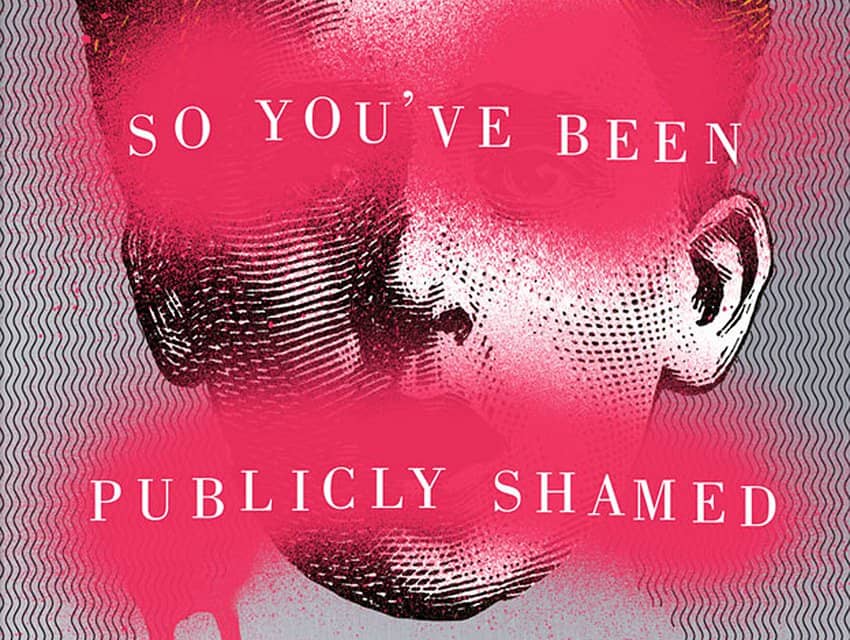
Ronson says Facebook and Twitter and blogs have created a renaissance of public shaming. It’s so easy to hide online and eviscerate someone. And grotesquely, we seem to love watching it happen. Ronson said people pleasure in ganging up against the person being shamed. For a little while, it feels good to take someone down. He says it makes us feel powerful. The average Joe gets to be Rosa Parks for a day.
When there is a lynch mob out for blood on social media, and it’s you they’re after, oftentimes the safest thing (and usually the best thing, according to Ronson) is to do nothing. Play dead. Because if you fight back, they will only come back at you harder. There’s only one of you and there are hundreds — or even thousands of them. And when they are whipped up in the white heat of anger, you do not want to provoke them. You want to duck and hide and protect yourself from the hurricane.
Which is why I stayed silent for so long and did not try to defend myself. I think I was also in shock. Also, I had a different experience with public shaming because most people did not attack me directly. People unfriended and blocked me on Facebook, so I couldn’t see them and I didn’t know what they were saying. But then I’d get an email from a former customer or client saying, “I heard bad things about you.”
Our blog network was made up of mostly women, and women have a different way of shaming then men. They generally don’t say bad things to your face. They spread it in small groups, in the shadows. Not out in the open. Women are supposed to be “nice” which is why they gossip behind closed doors. Honestly, I’d rather have someone say it to my face — then we can talk about it, resolve our differences, and move beyond it. There is conflict in life and business, and there are misunderstandings and mistakes. But most conflict can be resolved and relationships can be repaired when we talk through it.
And online media shaming can be permanently damaging. Google search results and Facebook comments are like a scarlet letter that you can’t erase. It doesn’t just hurt you financially, it hurts you emotionally. And the pain is worse than anything I’ve ever felt.
It’s a great book and really helped me understand this mob mentality. It helped me to forgive the people who hurt me, as well as the people who did not come to my defense. It wasn’t that people didn’t care about me. They just couldn’t, lest they be attacked.
Even if you have never been publicly shamed, one day you could be. “There but for the grace of God, go I.”
I think everyone should read this book. Not only is it a great read, but also to prevent others from being shamed. We are all human. We all make mistakes. And what we need in our culture is more forgiveness, more understanding, not more blaming and shaming.
Daring Greatly
The next book I read that helped me break through the shame was Daring Greatly by Brené Brown. I can’t recommend this book highly enough. Again, a book everyone should read. (Thank you, Cathy Raymond for reminding me of this book!)
Brené says shame can’t live in the light. She says when you stand up, speak out, and own your story, the shame goes away. And you get to write your own happy ending.
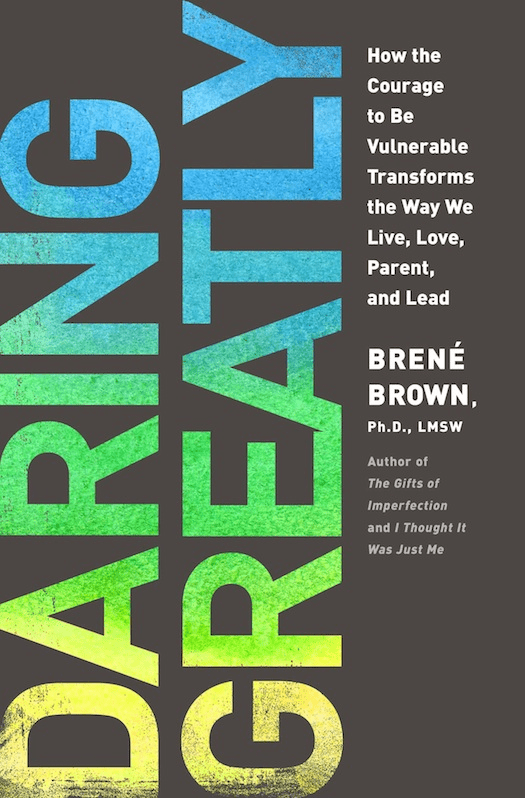
I am so grateful that I get to end this chapter and write my own ending. Thanks, Brené. And thanks to all my readers and friends who stuck with me and who want to keep hearing my stories.
What is the happy ending I’m writing? I haven’t decided yet. I do know I’m going to continue blogging and sharing about real food and health. And yes, I’m going to make another million. Heck, why not tens of millions. Because when my next company generates tens of millions in revenue, just think how much more we will be doing to impact the world in a positive way.
I know there are things I did not say in this post. There are things I left out. But I can’t cover it all. And for those of you who want to argue with me or make points against me in the comments, telling me I missed this or that, or telling me how I got something wrong or did something wrong, that’s fine.
I also know there are people out there who are reading this who are telling different stories about me. I know there are people who hate me or are mad at me, people who think I’m a jerk. And that’s fine. They can tell themselves whatever they want about me. They can make up the stories they want to believe. As Terry Cole-Whittaker said, “What you think of me is none of my business.”
If you have issues with me that you can’t let go of, let’s resolve it and move on. You can email me or message me on Facebook. annmarie @ villagegreennetwork.com still works. If you have something to say to me, say it to me instead of talking behind my back.
And here is what I will say to you… Brené Brown named her book Daring Greatly based on this quote from Theodore Roosevelt. It’s easy to criticize. It’s not so easy to be in the arena, daring greatly.
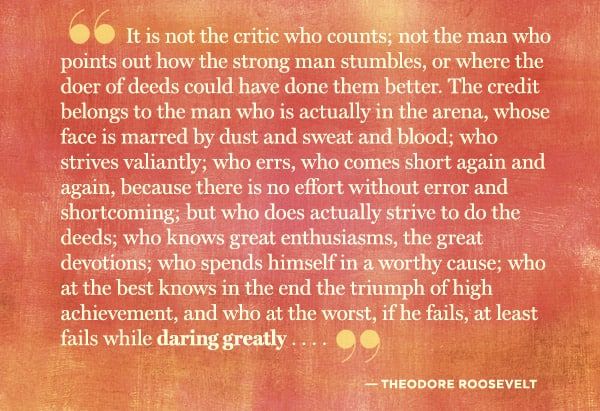
Yes, I failed. But you know what? It wasn’t really failure. Because it’s not over. The fat lady hasn’t sung yet. And failure is the path to success. If you’re too afraid of failure that you never do anything, you’ll never succeed.
Another way to look at it: I didn’t fail. The company failed. The business model was a failure.
On to the next one. And I wouldn’t change a thing about what I went through. It’s intense pressure that creates diamonds.
The Freedom That Comes from Failure
You want to know why I’m so grateful that my business failed? Because of the gifts I got. The gift of fearlessness. The gift of putting myself out there in the face of no support. The gift of being able to be myself, experience public humiliation, and realize that, while it was bad, I didn’t die. The gift of no longer having to worry about what everyone thinks of me. The gift of being able to drop the straight jacket of perfectionism.
Failure is a gift. Because it frees you.
As my good friend, farmer Mark McAfee of Organic Pastures Dairy (my raw dairy here in California) said when I was going through all of this (he was one of the wonderful friends who stuck by me). He said (paraphrase), “I have been where you are. When we started selling raw milk, we had to end our contract with Organic Valley. And for a while I didn’t know how we were going to pay the mortgage and I had two kids to support. But I learned that when you’ve got nothing, you’ve got nothing to lose. And that’s when you become fearless.”
I always wondered how Mark was so brave fighting for raw milk. Now I know. He’s fearless. Just think what I’m going to be able to do now that I’m fearless, too.
There is no greater freedom than fearlessness. As hard as it was, I’d do it all over again to feel the way I feel today. Cloaked in courage. Basking in confidence. There is no better feeling. The past two years were a nightmare, but I’ve broken through to the other side and it was all worth it.
And the other big thing I learned? That I’m worthy. I’m worthy of success. I’m worthy of making money. I’m worthy of having my voice heard. My time and energy and gifts are valuable. Not everyone will value me or my gifts, and that’s okay. Because plenty of people do. And most of all, I do.
As much as we don’t enjoy pain and suffering, it is the contrast in life that is the best teacher. Losing all my money, friends, and like I said, what seemed like everything, helped me realize what is really important. It helped me be so much more grateful for the things I do have. I appreciate my family. I appreciate having a bed to sleep in and a roof over my head. I appreciate my children my husband who loves me and whom I love so much.
I will never value myself so little again. And I’ll never take anything or anyone for granted again.
If there is something you would like to do in life, but you’re holding yourself back because you’re afraid of being ridiculed, of failing, of looking like a fool, the secret is that failure is your friend. Failure is the real gift.
So what are you waiting for? As they say in Silicon Valley, Fail fast and fail often. Failure is the fast track to success.
And with that, I’m picking myself back up and going back to doing what I can to make the world a better place. Because that is my job. I’ll see you on the next blog post.
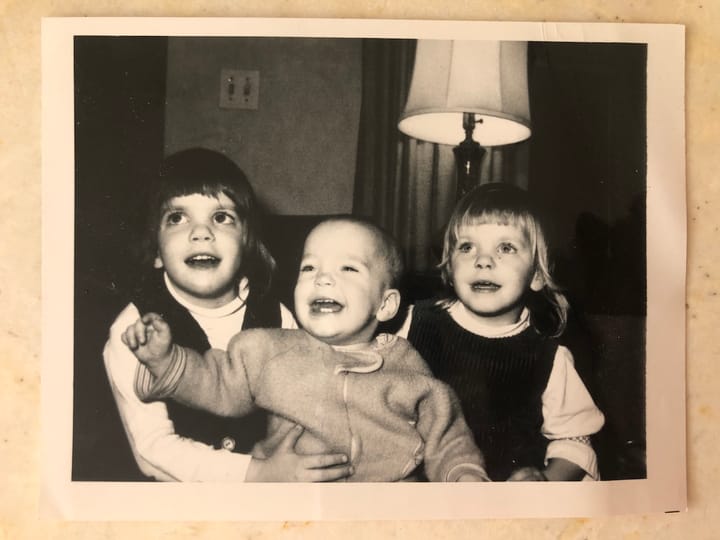
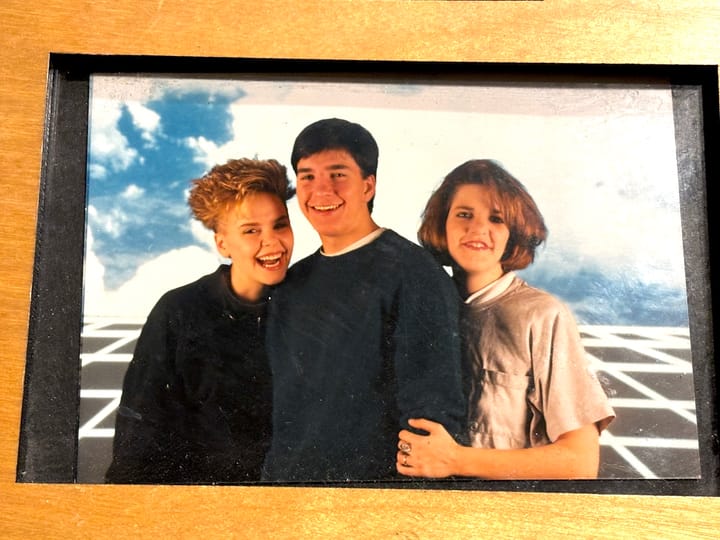

Comments ()